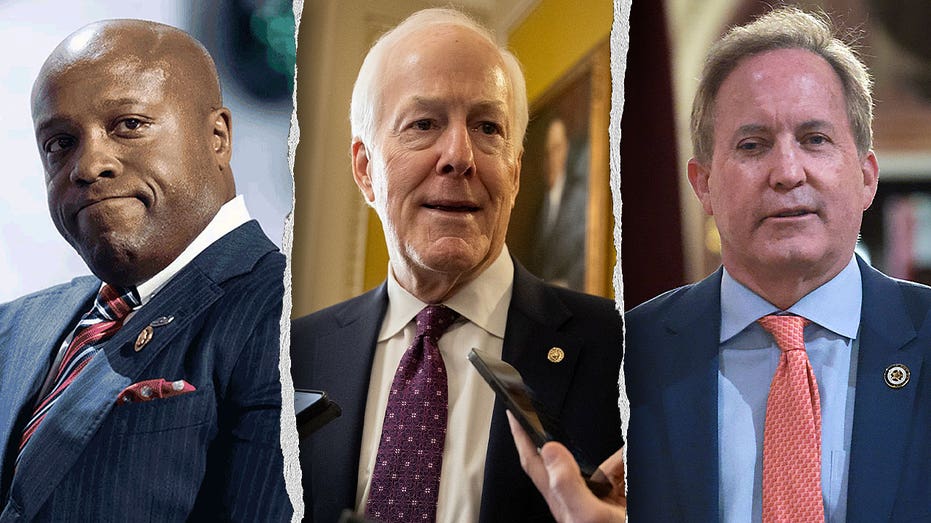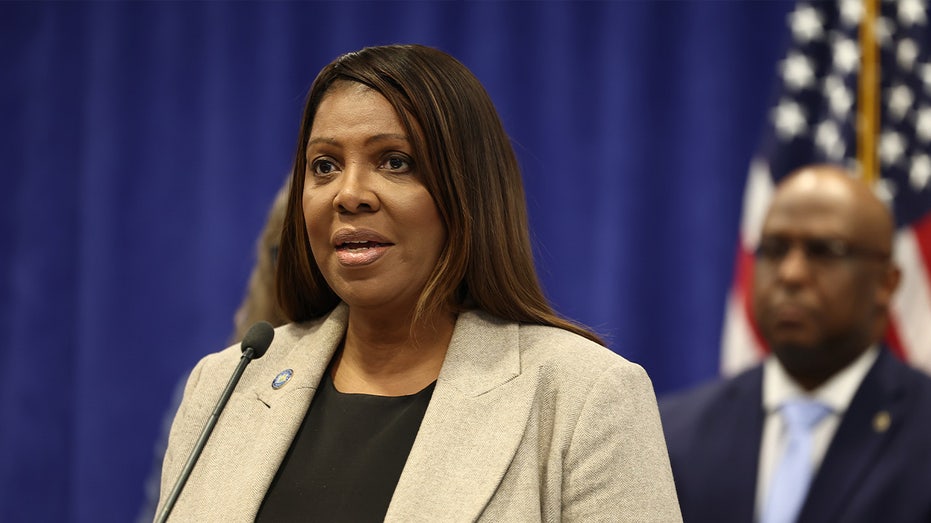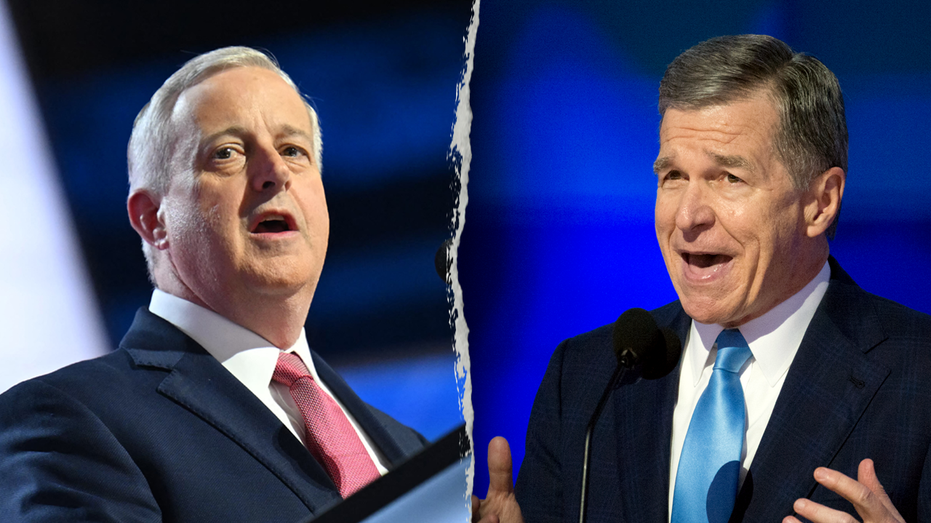Combustible Republican Senate primary in Texas heading into overtime

AUSTIN, TEXAS – The expensive and contentious battle for the Republican Senate nomination in Texas is headed to a May runoff, after none of the three major candidates in the crowded field of contenders topped 50% of the vote in Tuesday’s primary election. Longtime incumbent Sen. John Cornyn will face off with Texas Attorney General Ken Paxton after they finished in the top two in the primary, with Rep. Wesley Hunt in third place, the Associated Press reports. The winner will face off with either rising star state Rep. James Talarcio or progressive firebrand Rep. Jasmine Crockett, a vocal critic and foil of President Donald Trump, who were vying for the Democratic Senate nomination. Both are trying to become the first Democrat in nearly four decades to win a Senate election in right-leaning Texas. This year’s Senate showdown in Texas is one of a handful across the country that could determine if Republicans hold their majority in the chamber in the midterm elections. The GOP currently controls the chamber 53-47. IT’S SHOWDOWN DAY IN TEXAS AS COMBUSTIBLE BATTLES FOR THE DEMOCRATIC AND GOP SENATE NOMINATIONS COME TO A HEAD The Cornyn campaign and aligned super PACs spent nearly $100 million to run ads attacking Paxton and Hunt, with the senator charging in the closing weeks of the primary campaign that Democrats will flip the seat in the general election if Paxton’s the GOP’s nominee. Cornyn, his allies, and the National Republican Senatorial Committee (NRSC), the campaign arm of the Senate GOP, repeatedly pointed to the slew of scandals and legal problems that have battered Paxton over the past decade, as well as his ongoing messy divorce. TRUMP’S IRAN STRIKE ROCKS SENATE PRIMARIES IN TEXAS “If I’m the nominee, I’ll help President Trump by making sure that we carry the five new congressional seats as well as maintain this Senate seat and will help him continue his agenda through the last two years of his term of office,” Cornyn touted in a Fox News Digital interview on Sunday. And, he argued, “If the Democrats win, because we nominate a flawed candidate with incredible baggage like the attorney general, then that last two years of [Trump’s] agenda is jeopardized, as well as everybody down ballot that we need to continue to elect as Republicans.” Speaking to reporters on primary night, Cornyn emphasized, “Over the next 12 weeks, Texas Republican primary voters will hear more about my record of delivering conservative victories in the United States Senate, and learn more about Ken’s indefensible personal behavior and failures in office.” “Just like the primary, we have a plan to win the runoff, and we are in the process of executing it. Judgment day is coming for Ken Paxton,” Cornyn vowed. PAXTON DEMANDS STRICTER VETTING AFTER DEADLY TEXAS RAMPAGE Paxton, a MAGA firebrand who grabbed significant national attention by filing lawsuits against the Obama and Biden administrations, pushed back, telling Fox News Digital on the eve of the primary that “I’m 3-0. I’ve won three statewide races.” Pointing to public opinion polls suggesting he has the edge over Cornyn, Paxton argued, “it’s really easy for him to say that when he’s losing a primary, because he’s not delivered for the people of Texas, and he’s going to find out tomorrow what that means. He’s going to end up losing.” “This idea that I can’t win a race is not true… there’s no evidence of what he’s saying is being true. As a matter of fact, the evidence is just the opposite,” Paxton added. On primary night, as he looked ahead to the runoff election, Paxton told supporters, “As we head into this runoff, we’re going to make the choice even clearer. While John Cornyn was cutting deals on gun control and amnesty, I was suing corrupt Joe Biden over 107 times.” Paxton was boosted a few weeks ago by an endorsement from the political wing of Turning Point USA, the powerful grassroots conservative organization that was long steered by the late Charlie Kirk. The GOP nomination battle was a two-person race until Hunt, a West Point graduate and military veteran who flew helicopters during his service and who represents a solidly red district in suburban Houston, announced his candidacy last autumn. “I think there’s going to be a runoff, no matter what happens,” Cornyn predicted on Sunday. Paxton, speaking to supporters on primary eve, touted that “if we go to a runoff, the odds get better for me,” as he pointed to what will likely be a smaller electorate for the May 26 runoff. Hunt, in a Fox News Digital interview on the eve of the primary, argued that he’s “the best candidate to win the primary and win the general.” TRUMP’S IRAN STRIKE ROCKS TEXAS SENATE RACE AS DEMS DEMAND ‘WAR POWERS,’ GOP APPLAUDS PRESIDENT And pointing to the negative ads from Cornyn and his allies that have targeted him the past couple of weeks, Hunt said, “They have spent tens of millions of dollars against me in the state of Texas, which means that I must be doing the right thing, and I must be a threat. DC will not decide who will be the next senator from Texas. Texans will and that’s why I got in this race.” Hunt fell far short of his goal. But in his concession speech, Hunt teased, “This will not be the last time you see my name on a ballot. I can assure you. We’ve learned some valuable lessons, have some valuable knowledge.” Trump, whose clout over the GOP remains immense, stayed neutral in the Republican primary race. All three candidates, who sought the president’s endorsement, were in attendance Friday as Trump held an event in Corpus Christi, Texas. “They’re in a little race together,” Trump said of Cornyn and Paxton. “You know that, right? A little bit of a race. It’s going to be an interesting one, right? They’re both great people, too.” Trump also complimented Hunt, and said that all three contenders were engaged
New York AG orders Manhattan hospital to resume gender-transition treatment for transgender youth

New York Attorney General Letitia James is instructing a Manhattan hospital to resume offering gender-transition treatment to transgender youth after it ended such treatments last month over funding threats from the Trump administration. NYU Langone’s decision to close its Transgender Youth Health Program violated the state’s anti-discrimination laws by “jeopardizing access to medically necessary healthcare for some of the most vulnerable New Yorkers,” James wrote in a Feb. 25 letter first made public this week. James’ office threatened “further action” if the hospital does not immediately resume offering hormone therapies, puberty blockers and other treatment to transgender youth. TOP NEW YORK HOSPITAL TO END TRANSGENDER PROGRAM FOR MINORS NYU Langone, one of the city’s largest hospital systems, said last month it would stop providing certain gender-transition treatments for patients under the age of 19. “Given the recent departure of our medical director, coupled with the current regulatory environment, we made the difficult decision to discontinue our Transgender Youth Health Program,” NYU Langone spokesman Steve Ritea said in a statement at the time. “We are committed to helping patients in our care manage this change. This does not impact our pediatric mental health care programs, which will continue.” The hospital ceased admitting new patients into its transgender youth program last year after President Donald Trump signed an executive order entitled “Protecting Children from Chemical and Surgical Mutilation,” which aims to restrict gender-transition treatment for people under 19. Referencing Trump’s order, the U.S. Department of Health and Human Services later announced a proposal to cut federal Medicaid and Medicare funding to hospitals that provide these treatments to transgender youth. But the Feb. 25 letter signed by the attorney general’s health care bureau chief, Darsana Srinivasan, said the proposal did not officially change federal law and did not affect a “medical institution’s existing duties and obligations under New York law.” “The sudden discontinuation of medically necessary transgender healthcare can have severe, negative health outcomes,” Srinivasan wrote. “Accordingly, the Attorney General is extremely concerned by your institution’s decision to cease the provision of care to this vulnerable, minority population.” LETITIA JAMES SUES HHS OVER TYING FEDERAL FUNDS TO TRANSGENDER POLICY The letter gives the hospital until March 11 to show its compliance, although it is unclear what steps would be taken if it fails to resume the treatments. Several other hospitals across the country have also halted transgender youth treatments following Trump’s executive order and funding threats. The Associated Press contributed to this report.
Suspect arrested outside Paxton HQ with ammo in car following disturbance

Ahead of the polls closing in Texas Tuesday, on the first major primary night of the 2026 midterms, a suspect in possession of ammo was arrested outside GOP candidate Ken Paxton’s Dallas headquarters around 5:15 p.m., later found to be making a delivery to an employee. The incident follows what officials are investigating as a terror-related mass shooting outside an Austin bar, by a man who was in possession of an Iranian flag and who was wearing a shirt that read “Property of Allah.” Video of the Tuesday early-evening incident shows ammo being placed on the hood of a car as they searched the vehicle in question. The suspect handcuffed can also be seen. Following an interview with the suspect, investigators determined the individual was at the location to make a delivery to an employee. He was transported to the Dallas County Jail without incident. AUSTIN BAR SHOOTING VICTIMS NAMED AS FBI INVESTIGATES POTENTIAL TERRORISM NEXUS The arrest came after Dallas police officers were called to the 3000 block of Fairmount Street due to reports of a “suspicious individual,” according to authorities. The suspect reportedly entered a vehicle that did not have license plates properly displayed and proceeded to leave the area. Officers then conducted a traffic stop and the driver was subsequently arrested for traffic violations. After police searched the suspect’s vehicle, they found ammunition inside the car. Tuesday marked the first major primary night of the 2026 midterms, which will culminate with a slew of general elections in November. TEXAS DA SAYS NO CHARGES FOR POLICE IN TERROR ATTACK RESPONSE AMID CRITICISM OF MANDATORY GRAND JURY REVIEW Texas is facing some contentious primaries Tuesday, including Paxton’s U.S. Senate race and a slew of important House races. After calls from Democrats to extend voting hours Tuesday, a judge decided to keep them open an extra two hours until 9:00 p.m. The extension followed chaos because local Republican parties refused to hold joint primaries with Democrats, creating changes in typical ballot casting structures, according to the Associated Press. Paxton is facing up against longtime incumbent Sen. John Cornyn, R-Texas, who has held the seat since 2002. Rep. Wesley Hunt, R-Texas, is also in the race and will likely force a runoff race, experts have indicated. Due to the likelihood of a runoff, the results probably will take several weeks for the Texas GOP Senate primary.
Pentagon identifies four soldiers killed in March 1 drone strike during Kuwait military operation

The Department of War on Monday identified four of the six U.S. Army Reserve soldiers killed in a March 1 drone attack in Kuwait while supporting Operation Epic Fury, and officials said the incident remains under investigation. The soldiers were killed at the Port of Shuaiba during what officials described as an unmanned aircraft system attack. All were assigned to the 103rd Sustainment Command in Des Moines, Iowa, which provides logistical and operational support to U.S. forces overseas. The fallen service members were identified as Capt. Cody Khork, 35, of Lakeland, Florida; Sgt. 1st Class Nicole Amor, 39, of White Bear Lake, Minnesota; Sgt. 1st Class Noah Tietjens, 42, of Bellevue, Nebraska; and Sgt. Declan Coady, 20, of Des Moines, Iowa. Two additional soldiers killed in the attack have not yet been publicly identified. Lt. Gen. Robert Harter, chief of Army Reserve and commanding general of U.S. Army Reserve Command, said the loss is deeply felt across the force. FORMER TOP GUN PILOT DECLARES IRAN MILITARY ‘OVER WITH’ AMID US AIR SUPERIORITY, BUT WARNS OF ANOTHER DANGER “We honor our fallen Heroes who served fearlessly and selflessly in defense of our nation,” Harter said. “Their sacrifice, and the sacrifices of their families, will never be forgotten.” Officials said the soldiers were supporting operations in the region when the drone strike occurred. Khork enlisted in the National Guard in 2009 as a multiple launch rocket system/fire direction specialist before commissioning as a military police officer in the Army Reserve in 2014. He deployed to Saudi Arabia in 2018; Guantánamo Bay, Cuba, in 2021; and Poland in 2024. His awards include the meritorious service medal, Army Commendation Medal and the Armed Forces Reserve Medal with 10 Year Device and “M” Device. 3 US WARPLANES SHOT DOWN BY KUWAITI AIR DEFENSES, PILOTS BAIL OUT IN FRIENDLY FIRE INCIDENT, CENTCOM SAYS Amor joined the National Guard in 2005 as an automated logistics specialist and transferred to the Army Reserve the following year. She deployed to Kuwait and Iraq in 2019 and earned multiple commendations, including the Army Commendation Medal and the Armed Forces Reserve Medal with “M” Device. Tietjens entered the Army Reserve in 2006 as a wheeled vehicle mechanic and completed two deployments to Kuwait in 2009 and 2019. His decorations include the Meritorious Service Medal, Army Achievement Medal and the Iraq Campaign Medal with Campaign Star. Rep. Don Bacon, R-Neb., said on X he was heartbroken to learn of Tietjens’ death. TRUMP SAYS US SANK 10 SHIPS IN IRAN STRIKE, ‘LAST, BEST CHANCE’ TO ACT “A native of Bellevue, he dedicated his life to defending our country and protecting the freedoms we hold dear,” Bacon wrote. “No words can fully express the sorrow his family and friends are enduring during this unimaginable loss. “Angie and I are praying for their healing and comfort in the days ahead. We also extend our deepest condolences to the loved ones of Capt. Cody Khork, Sgt. 1st Class Nicole Amor, and Sgt. Declan Coady,” he added. “These four soldiers are American heroes who made the ultimate sacrifice, and their courage and devotion to duty will never be forgotten.” The youngest of the four identified soldiers, Coady enlisted in the Army Reserve in 2023 as an Army information technology specialist and was posthumously promoted from specialist to sergeant. His awards include the National Defense Service Medal and the Overseas Service Ribbon. US STRIKES MORE THAN 1,700 TARGETS IN IRAN DURING FIRST 72 HOURS OF OPERATION EPIC FURY Iowa gubernatorial candidate Rob Sand also issued a statement. “Iowa: please join me in praying for Declan Coady, a 20-year-old Army Reservist and Drake student, who was one of the lives lost among the escalating conflict in the Middle East,” the statement said. “Join me in also praying for his family and loved ones and for all the communities he was part of, and thanking him for his service and ultimate sacrifice.” Maj. Gen. Todd Erskine, commanding general of the 79th Theater Sustainment Command, said the soldiers’ service reflected the highest ideals of the military. “To the families and teammates of these Cactus Nation Soldiers: you have my deepest sympathy and my respect,” Erskine said. “Our nation is kept safe by folks like these – brave men and women who put it all on the line every single day. They represent the heart of America. We will remember their names, their service, and their sacrifice.” Fox News Digital’s Alexandra Koch contributed to this report.
In divided North Carolina, Whatley and Cooper emerge for Senate battle that could tip Washington

Former Republican National Committee chairman Michael Whatley and former North Carolina Gov. Roy Cooper have secured the Republican and Democratic nominations respectively to succeed retiring Sen. Thom Tillis, R-N.C. Whatley, of Boone, and Cooper, of Nashville, were heavily favored to win their contests in a state that has been tough for Republicans at the gubernatorial level and for Democrats at the presidential level. Cooper faced businessman Daryl Farrow and technology sector consultant Justin Dues — both prior candidates for U.S. House — along with Pastor Orrick Quick and several perennial candidates. AFTER ROUGH 2025 ELECTIONS, TOP GOP HOPEFUL SAYS CONSERVATISM’S FUTURE RUNS THROUGH SOUND ECONOMIC MESSAGE Whatley faced retired Navy JAG officer Don Brown, who previously ran for Congress against Rep. Mark Harris, R-N.C. Another major GOP candidate was former Wake County school board candidate Michele Morrow. Immigration has been a key issue in the race, as Whatley has hammered Cooper for repeatedly vetoing bills from Raleigh’s state legislative Republican majority that would have compelled local cooperation with ICE. “If Roy Cooper had not vetoed legislation that would have forced sheriffs to honor the ICE detainers, then these people would not have been on the street,” Whatley said. ICE, along with Tarheel State-native Border Patrol Cmdr. Gregory Bovino, captured at least 120 illegal immigrants in Charlotte and the Triangle during operations last year. “It’s unfortunate that the Trump administration has to go into a city like Charlotte and help to clean up the city. It would be great if the state and the local officials were to be as concerned for their citizens as they were for the illegal immigration advocates that they’re pushing,” Whatley added at the time. Cooper vetoed at least three bills during his eight-year tenure dealing with ICE cooperation that were drafted by the GOP-majority legislature. SWING-STATE DEM IN CRUCIAL SENATE RACE FACING HEAT FOR WEEKS LONG SILENCE ON HEINOUS ILLEGAL IMMIGRANT CRIME In August 2019, Cooper vetoed a bill from current House Speaker Destin Hall, R-Lenoir, that would have required sheriffs to honor ICE detainers and hold suspects until they could be transferred to the feds. Cooper reportedly said the bill was trying to use “fear to divide North Carolina,” but the effort eventually succeeded as part of a package expanding private-school vouchers. Cooper has pushed back, with a spokesman telling Fox News Digital that sheriffs in Wake, Mecklenburg and Durham counties all opposed Republicans’ legislation – and backed his own move to veto them. Eight other sheriffs backed Cooper’s veto. “Roy Cooper is the only candidate who spent his career prosecuting violent criminals and keeping thousands of them behind bars, and numerous North Carolina sheriffs spoke out against this legislation at the time because of a lack of resources; a problem that Washington, D.C. insider and Big Oil lobbyist Michael Whatley has made worse because of his support for cuts to local law enforcement,” the spokesman said. The race sets up a high-stakes fall general election, where Whatley hopes to maintain Republicans’ grip on the seat, and a Cooper win could throw the Senate’s Republican majority into jeopardy. The last time a Democrat held a North Carolina U.S. Senate seat was from 2009–2015 with Sen. Kay Hagan, whom Tillis eventually defeated. Before that, scandal-plagued vice presidential candidate John Edwards split the state’s representation with Republican Elizabeth Dole, the wife of 1996 GOP presidential nominee Bob Dole.
Trump says NYC Mayor Mamdani made ‘big progress’ embracing Declaration of Independence

President Donald Trump said New York City Mayor Zohran Mamdani has made “big progress” in embracing the Declaration of Independence during a meeting at the Oval Office, using the moment to spotlight what he described as a significant shift in tone. “Zohran has come a long way embracing, of course, the Declaration of Independence while at The Oval Office – Big progress! President DJT,” Trump wrote on Truth Social. Trump included a photo of Mamdani standing in front of the Declaration of Independence. Fox News Digital reached out to Mamdani’s office for comment. MAMDANI’S RESPONSE TO TRUMP’S IRAN STRIKE SPARKS CONSERVATIVE BACKLASH: ‘ROOTING FOR THE AYATOLLAH’ The post comes less than a week after Mamdani visited President Donald Trump at the White House for a previously unscheduled meeting, where the two discussed immigration and housing issues affecting New York City. Afterward, Mamdani wrote that Trump told him Columbia University student Elaina Aghayeva, who he said had been detained by Immigration and Customs Enforcement earlier that day, would be released. “Just got off the phone with President Trump,” Mamdani wrote. “In our meeting earlier, I shared my concerns about Columbia student Elaina Aghayeva, who was detained by ICE this morning. He just informed me that she will be released imminently.” MAMDANI, PRESIDENT TRUMP HAVE BEEN TEXTING AT LEAST TWICE A WEEK — AS UNLIKELY BROMANCE BLOSSOMS: SOURCES Despite the public display of cordiality, Mamdani later criticized the U.S. military strikes on Iran that he said marked an escalation of conflict. “Today’s military strikes on Iran – carried out by the United States and Israel – mark a catastrophic escalation in an illegal war of aggression,” Mamdani wrote. “Bombing cities. Killing civilians. Opening a new theater of war. Americans do not want this. They do not want another war in pursuit of regime change.” TRUMP TELLS NYC MAYOR ZOHRAN MAMDANI COLUMBIA STUDENT DETAINED BY ICE WILL BE RELEASED He added that Americans prefer “relief from the affordability crisis” and addressed members of New York City’s Iranian community directly. “You are part of the fabric of this city – you are our neighbors, small business owners, students, artists, workers, and community leaders,” Mamdani wrote. “You will be safe here.” The post drew criticism from conservatives on social media, who argued Mamdani’s response appeared sympathetic to Iran’s regime and noted his lack of public reaction to Iranian protesters killed in recent years. Fox News Digital’s Andrew Mark Miller contributed to this report.
Watch the most viral moments as Kristi Noem’s hearing goes off the rails

Department of Homeland Security Secretary Kristi Noem sparred with members of the Senate Judiciary Committee Tuesday over the Trump administration’s immigration enforcement crackdown, a long-awaited hearing after the agency has come under scrutiny in recent months for its hard-line immigration enforcement effort and the fatal shootings of Renee Good and Alex Pretti in January. The department’s handling of the Minnesota unrest has placed Noem and ICE officers squarely in Democrats’ crosshairs in recent weeks and has prompted Democrats — and two Senate Republicans — to call for Noem to resign. The hours-long hearing comes as the Senate remains deadlocked on a plan to fully fund DHS through September. Democrats in the chamber previously outlined a list of 10 demands they said immigration officers must meet before they would agree to pass the short-term funding measures. ‘YOU SHOULD BE ASHAMED!’: PROTESTER DRAGGED FROM KRISTI NOEM’S SENATE HEARING Senate Democratic Whip Dick Durbin, D-Ill., and others have criticized Noem for asking them to fully fund DHS despite the weeks that passed between the two ICE shootings in Minnesota and Noem’s testimony. She “expects us to rubber stamp her record-breaking budget in the meantime,” Durbin said previously. Republicans and Noem used the hearing Tuesday to warn of the knockdown effects the partial shutdown has had on the myriad federal departments and agencies housed under DHS’s sprawling umbrella, including the Secret Service, Transportation Security Administration, FEMA and the U.S. Coast Guard, among others. Here are the biggest moments from Tuesday’s hearing. Noem focused her ire during Tuesday’s hearing on Senate Democrats, whom she blamed for failing to keep DHS funded through September even after the House passed a bipartisan, full-year funding bill. “Despite the House passing a bipartisan, bicameral, full-year DHS funding bill, it is Senate Democrats who have chosen not to fund the department and have held this department hostage,” Noem said Tuesday, mentioning critical national security efforts that could be hampered as the result of a protracted shutdown, including, but not limited to, issues of border security, immigration enforcement, aviation security, disaster response, cybersecurity and the protection of critical infrastructure. She also cited the effect the agency-wide shutdown has on DHS employees in about 22 federal departments and agencies within DHS. “More than 100,000 dedicated DHS employees are once again being asked to work without pay for the third time in just five months at a time when we produced the most secure border in history and removed nearly 3 million illegal aliens from our country,” she said. “Disrupting the department responsible for those gains is indefensible.” DHS SECRETARY KRISTI NOEM ADDRESSES CALLS FOR HER FIRING, NEW ALEX PRETTI VIDEO Earlier Tuesday, Durbin pressed Noem to explain what he said was DHS’s lack of compliance with federal court orders that have sought to block or pause some of the Trump administration’s sweeping immigration enforcement efforts and removals. “Sir, we ensure that we follow the law that applies to our department, and who we detain and who we deport back to their home countries,” Noem told Durbin. Durbin followed up by referencing a statistic from Trump’s first term that found 85% of the migrants ICE arrested “had no violent criminal record.” “Sir, when you talk about violent crimes, what you’re saying is the crimes that don’t matter, that you aren’t counting, are the ones that affect American families every single day,” Noem responded. “You’re not counting DUIs. You’re not counting embezzlement. You’re not counting theft. And you’re not counting the other crimes against people and drug trafficking and proliferating that. ” If you were counting crimes that these individual illegal aliens in this country have committed, it would be well over 65% to 70% of the individuals that are detained today have those crimes on their record,” Noem said. “Besides the crime of being in this country illegally.” DEMOCRATS DEMANDING ICE REFORMS LOSE AIRPORT ESCORTS IN SHUTDOWN THEY TRIGGERED In one notable moment, Sen. Chris Coons, D-Del., pressed Noem on whether DHS planned to deploy ICE officers to polling sites on Election Day, echoing a view recently endorsed by former Trump advisor Steve Bannon. Asked whether she would rule out deploying ICE or CBP agents to polling places during the upcoming November midterm elections, Noem responded that there are “no plans to have ICE officers at our polling locations.” “I’m glad to hear that,” Coons responded. “But would you rule it out? Would you say it will not happen?” In response, Noem shot back, “Do you plan on illegal aliens voting in our elections?” That moment earned wide praise from conservative commentators on social media. Noem also updated Grassley on the status of HHS’s Unaccompanied Children (UC) program, which, under the Biden administration, placed more than 11,000 migrant children with non-vetted sponsors to house the children who were not a parent or legal guardian, according to information shared by his office. Grassley’s office previously submitted multiple oversight requests to DHS on the program, citing concerns that it placed children with dangerous or unvetted sponsors and restricted sharing information with law enforcement. Grassley and the Trump-led DHS have alleged that the Biden administration turned a “blind eye” to children who needed proper supervision and care and cited concerns over background check failures, a lack of documentation in some cases and lax vetting procedures that allowed migrant children in the program to be “lost” or otherwise released to dangerous sponsors. The Department of Homeland Security’s Office of Inspector General released a report on the program last year, and Noem appeared to reference it during her testimony Tuesday. Noem told lawmakers Tuesday that 450,000 children who entered the U.S. as “unaccompanied alien children” were “lost by the Biden administration and not tracked.” “We’ve located about 145,000 of them, and we’ve done that through the investigative work of our Homeland Security Investigations team,” Noem said. “The one thing that has been challenging is that, under the Biden administration, the government paid sponsors in HHS in order to host these children and those sponsors. Many times,
Trump says he might have ‘forced Israel’s hand’ in Iran strike decision as critics question war powers

President Donald Trump on Tuesday insisted Israel did not pressure him to conduct joint military strikes on Iran, claiming that he believed Iran’s Supreme Leader Ayatollah Ali Khamenei “was going to attack first.” Days after the regime leaders were killed and war erupted in Iran, Trump addressed the decision to conduct a joint U.S.-Israel attack on the country, explaining he “might have forced Israel’s hand.” “I might have forced their hand,” Trump said from the White House Oval Office on Tuesday. “You see, we were having negotiations with these lunatics, and it was my opinion that they were going to attack first. … If we didn’t do it, they were going to attack first. I felt strongly about that. … So, if anything, I might have forced Israel’s hand.” Although sources previously told Fox News the timeline of the attack was moved up to seize an opportunity to strike regime leaders in downtown Tehran, Trump said both the U.S. and Israel were ready. TRUMP SLAMS STARMER AS ‘NOT WINSTON CHURCHILL’ FOR REFUSAL TO BACK IRAN STRIKES “We’ve had a very, very powerful impact because virtually everything they have has been knocked out,” the president said. “Now, their missile count is going way down. Amazingly, they’re hitting countries that were, let’s call them neutral … I think they were surprised. I was surprised, I think. Now those countries are all fighting against them and fighting strongly against them.” Trump’s comments came after Democrats criticized his decision to launch strikes with Israel in Iran without congressional approval. Administration officials said they provided congressional notification to the “Gang of Eight,” a bipartisan group of top congressional intelligence leaders, ahead of the strikes, but Congress did not hold a vote to approve them. ‘THE RIGHT THING’: PAXTON, CORNYN TRADE BLOWS IN TEXAS PRIMARY BUT UNITE FOR TRUMP’S IRAN STRIKES The Trump administration has argued the U.S. was facing an “imminent threat,” prompting military action. Secretary of State Marco Rubio said the U.S. was not going to “sit there and absorb a blow” from Iran, while War Secretary Pete Hegseth said the operation was not a “so-called regime change war” or an open-ended conflict like that in Iraq. Trump said he believes regardless of whether the U.S. took part in the strikes on Iran, Democrats would have been unhappy with his decision. IRAN NUCLEAR TALKS ‘DIDN’T PASS THE SMELL TEST’ BEFORE TRUMP LAUNCHED STRIKES, SAYS VANCE “If I didn’t do this, guys like [Senate Minority Leader Chuck] Schumer who — losers, the Democrats [are] losers — … would say, ‘well, you should have done this.’ In other words, if I did it, it’s no good. If I didn’t do it, they would have said the opposite, ‘that you should have done this.’” He added he has “never had more compliments” on presidential action he has taken, noting “people felt that something had to be done.” “We [might] have a little high oil prices for a little while, but as soon as this ends, those prices are going to drop, I believe lower than even before,” Trump said. Fox News Digital’s Emma Colton contributed to this report.
Fox News Poll: Views are divided on US action against Iran

Voters are divided on U.S. military action against Iran, even as a majority sees the country as a security risk. A new Fox News national survey finds 61% think Iran poses “a real national security threat” to the United States. That view is similar to most previous Fox News surveys since 2006. The notable exception was when concern hit 73% last June, right before the U.S. military mission against Iranian nuclear facilities called Operation Midnight Hammer. WHERE TRUMP STANDS IN THE EYES OF AMERICANS AHEAD OF THE STATE OF THE UNION ADDRESS Even though a majority views Iran as a danger to the country, that concern does not translate into majority support for the current U.S. military action, as 50% approve and 50% disapprove. In addition, 51% think President Trump’s handling of Iran has made the U.S. less safe, up from 43% last July. Twenty-nine percent say he’s made the U.S. safer. By comparison, when the same question was asked about former President Biden in 2023, 50% said his handling of Iran had made the U.S. less safe, while 12% said safer. FOX NEWS POLL: BEYOND RED VS. BLUE, FINDING ME + YOU ACROSS THE POLITICAL DIVIDE Among Republicans, more than 8 in 10 approve of the current U.S. use of force, while only 6 in 10 say the president’s actions on Iran are making the U.S. safer. Nearly 8 in 10 Democrats disapprove of the U.S. strikes and think things are less safe because of Trump’s performance, while 6 in 10 or more independents think the same on both counts. Among voters who have served in the military, 59% approve of the U.S. strikes on Iran (39% disapprove). Compared to voters overall, who say the U.S. is less safe by a wide margin, veterans are more closely divided on the question of whether Trump’s actions have made the country safer (37%) or less safe (44%). In a joint effort with Israel, the United States started launching strikes on Iran on Saturday morning as part of a mission called “Operation Epic Fury.” All survey interviews were conducted after the bombings began, from Saturday through Monday. Trump’s job rating on foreign policy is underwater by 20 points, as 40% approve and 60% disapprove — including 21% of Republicans who disapprove. Some 43% of voters approve of Trump’s overall job performance, while 57% disapprove. In January and December, it was 44% approve vs. 56% disapprove. Perceptions of how the United States is viewed abroad have improved slightly since the end of the Biden administration. While a majority of 56% say the country is less respected around the world than it was four years ago, that’s an improvement from 61% who said the same in 2024 under former President Biden. Meanwhile, 30% say the U.S. is more respected, up from 23% under Biden and 29% during Trump’s first term. Two-thirds of voters are generally concerned that Trump’s use of executive orders and acting without Congressional approval may be permanently altering the country’s system of checks and balances. The results are nearly identical to when this same question was asked about Barack Obama during his presidency. CLICK HERE FOR CROSSTABS AND TOPLINE The survey also revisited attitudes about last June’s U.S. airstrikes on Iran’s nuclear facilities. When asked to think back, voters are closely divided between saying those strikes were mostly successful (30%) and mostly a failure (31%), but the most common answer is it’s too soon to say (37%). That’s about the same as views in July 2025, immediately following the strikes. Conducted February 28-March 2, 2026, under the direction of Beacon Research (D) and Shaw & Company Research (R), this Fox News survey includes interviews with a sample of 1,004 registered voters randomly selected from a national voter file. Respondents spoke with live interviewers on landlines (104) and cellphones (642) or completed the survey online after receiving a text (258). Results based on the full sample have a margin of sampling error of ±3 percentage points. Sampling error for results among subgroups is higher. In addition to sampling error, question wording and order can influence results. Weights are generally applied to age, race, education, and area variables to ensure the demographics are representative of the registered voter population. Sources for developing weight targets include the most recent American Community Survey, Fox News Voter Analysis, and voter file data. Fox News’ Victoria Balara contributed to this report.
Supreme Court ruling on secretive California gender policy could reshape parent rights fights nationwide

Parental rights advocates celebrated Monday after the Supreme Court temporarily stopped California from blocking school policies requiring parents to be told when their child identifies as transgender. Corey DeAngelis, a research fellow at the conservative Heritage Foundation, told Fox News Digital the high court’s order, in which the three liberal justices dissented, was a “huge win.” The decision marks the latest in a string of victories for conservatives seeking to tighten policies surrounding transgender people, though DeAngelis noted it only applies to California at this stage. “Parents in California should be very excited that the law that they have on the books to keep secrets from parents will no longer be in effect,” DeAngelis said, adding, “This precedent is surely a sign of good things to come. If there’s a lawsuit that arises in another state, you can be pretty sure that the Supreme Court is going to rule on the side of families.” The case, Mirabelli v. Bonta, arose from a lawsuit brought by California parents and teachers who argued that the state’s policy violated their rights under the Fourteenth Amendment and religious freedom rights under the First Amendment. The parents said the policy prevented school administrators from telling them about their child’s potential efforts to engage in gender transitioning unless the child consented to it. The policy also required school staff to use a student’s preferred name and pronouns regardless of the parents’ wishes. SCHOOL DISTRICT IN THE HOT SEAT AMID FRESH ALLEGATIONS OF HIDING STUDENTS’ GENDER TRANSITION After the U.S. Court of Appeals for the 9th Circuit sided with California Attorney General Rob Bonta, an elected Democrat, the parents and teachers appealed to the Supreme Court, and on an expedited and temporary basis, the high court vacated that order while the case proceeds through the lower courts. “The State argues that its policies advance a compelling interest in student safety and privacy,” the high court wrote in the unsigned order. “But those policies cut out the primary protectors of children’s best interests: their parents.” Justice Elena Kagan, an Obama appointee, wrote in a dissent that the temporary order was a sign that the Supreme Court’s emergency docket, sometimes known as a shadow docket, continued to “malfunction.” Attorneys for California argued that balancing the interests of parents and the “needs of transgender students” presented complex questions. “In this case, the district court entered a sweeping permanent injunction that would require instant, dramatic changes from the status quo,” California attorneys wrote. “Currently, under California’s laws and constitutional provisions on privacy and antidiscrimination, schools may balance parental interests with students’ particular needs and circumstances, such as the risk of harm upon disclosure of the student’s gender identity without student consent.” DeAngelis said the Supreme Court’s ruling also bolstered the case for school choice, which allows the government to funnel public education funds to schools parents want to send their children to that are not necessarily the designated public school in their neighborhood. CALIFORNIA SCHOOL DISTRICT LETS STUDENTS CHANGE NAMES AND GENDER IDENTITY IN SECRET FROM PARENTS “It would be great if more areas, like California, that are controlled by Democrats had policies like school choice. … You should be able to take your child’s education dollars somewhere else, to a private school that’s more aligned with your values, maybe a charter school,” DeAngelis said. He added that Monday’s decision was a “wake-up call for school choice policy as well, because parents may be upset about a lot of things in the public schools. Transparency is just the very bare minimum that the public schools in too many places aren’t getting right.” Carrie Severino, president of the conservative JCN Network, said the 9th Circuit appeared to disregard the Supreme Court’s key ruling last year in Mahmoud v. Taylor, which allowed parents to opt their children out of lessons that involved gender ideology or other sensitive topics based on religious beliefs. “The liberal Ninth Circuit disregarded the Court’s ruling in Mahmoud,” Severino wrote. “Today, the justices reaffirmed the principles of its landmark ruling and said that California’s law substantially interferes with the ‘right of parents to guide the religious development of their children.’” New York Times columnist David French also agreed with the high court’s decision. “The idea that a school could withhold such key information about a child from the child’s parents (in the absence of evidence of abuse) was ludicrously unconstitutional from the beginning,” French wrote on X.

